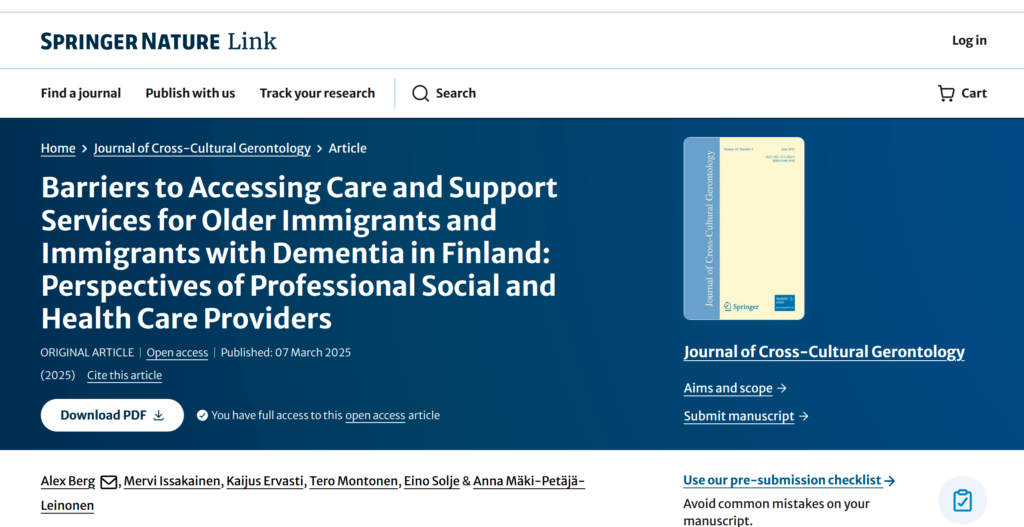Alex Berg: A Brief Overview of the Challenges that May Face Older Immigrants and Immigrants with Dementia Seeking Social and Medical Services in Finland
The experiences of older immigrants and immigrants with dementia seeking social and medical services is understudied in Finland. Our recently published manuscript focused on the obstacles that may restrict their legal rights and access to justice. Our approach to this topic was unique as it covered both social aspects and legal aspects. For example, we addressed the role of our target groups’ personal circumstances, support from their relatives and communities, their skills and competences, as well as the Finnish laws, in protecting and promoting their rights.

The study involved the perspectives of social and health care providers who offered services to older immigrants and immigrants with dementia. Semi-structured qualitative interviews were conducted with them, where they were asked in detail about their clients’ experiences when seeking social and medical services.
Barriers to Accessing Care and Support Services
According to our participants, our results showed that the language barrier is the most prominent challenge to receiving social and health care services. While our target groups are entitled to interpreters, challenges can still arise as there may be lack of available interpreters, on the one hand, or a non-specialized interpreter may be booked, on the other, leading to missing out on some important information. Furthermore, even though language training is offered to immigrants in general, older immigrants may find difficulties learning the language. Immigrants with dementia are at risk of forgetting the languages they learned at a later stage.
Another important challenge is the lack of digital skills. With Finland being one of the most digital countries in the world, lacking digital skills can pose a challenge to seeking care and support services. While this can impact anyone, including Finns, our target groups are more at risk of restricted access to social and medical services due to their potential lack of language skills, which may render them unable to navigate the digital services or use other conventional methods to seek services, such as calling the social or health care centers.
Older immigrants and immigrants with dementia in Finland also lack information about their rights and the available services. They are also unaware about their obligations. Our participants highlighted that even some Finns do not know about their rights in Finland. However, the issue with our target groups is that the lack of language and digital skills can further restrict their ability to find relevant information about their rights.
Moreover, our participants reported that the lack of expertise among professionals can restrict our target groups’ access to social and medical services. For example, some professionals are new graduates, and their decisions may not be based on experience. In some cases, some of the professionals’ decisions can be based on stereotypes and assumptions. There is therefore a lack of knowledge about the unique situation of clients who belong to ethnic minority groups.
Furthermore, lack of family and friends can restrict our target groups’ access to care and support services as they may have no one to help them with the language or the use of digital services. While anyone can experience loneliness and lack of help from others, older immigrants and immigrants with dementia are more at risk of loneliness as moving from different countries can mean leaving one’s relatives and friends behind.
However, having family and friends may not necessarily eliminate the challenges that face our target groups. This is because they may be exposed to financial or physical abuse from their relatives or friends, which in turn can hinder their access to justice.
Finally, cultural differences and conceptions can restrict our target groups’ access to care and support. This is because it can be normal in some cultures for children to make decisions on behalf of their parents, and they may decide not to accept services from official care providers. Moreover, in some cultures, relatives may tend to hide dementia from their older family members as it is shameful to have dementia, which can restrict our target groups’ access to appropriate services. It is also a common misassumption in some cultures that dementia is a normal part of aging. This can lead immigrant groups to refrain from seeking care and support.
Overcoming the Barriers
With these challenges put into account, our study pointed out the factors that facilitate our target groups’ access to justice. For example, family members, immigrant communities, and non-governmental organizations (NGOs) play an important role in facilitating our target groups’ access to services. Immigrant communities and NGOs help decrease the pressure on service demands. However, NGOs’ resources are limited, and it is crucial for state actors to increase their support for NGOs.
We recommend also employing more bilingual staff so that our target groups can seek services on their own in their native language. The provision of information about the available services in different languages can also help our target groups become acquainted with their rights and the available services. On part of professional social and health care providers, it is important for them to avoid stereotypes and assumptions, and treat the immigrants as any other clients, while simultaneously respecting their cultural and ethnic backgrounds.
We also recommend future research to involve the firsthand experience of older immigrants and immigrants with dementia, and involve diverse ethnic minority groups. The use of different theoretical frameworks, as well as addressing different issues, such as discrimination, employment, autonomy, and mental health, can help tackle other gaps in the research on older immigrants and immigrants with dementia in Finland.
Delve into the details of this research and check out the full open access article from here:
https://rdcu.be/ecENI.
Alex Berg works as a doctoral researcher in the Neuro-Innovation PhD Programme. His research focuses on the legal rights and access to justice for older immigrants and immigrants living with dementia in Finland.